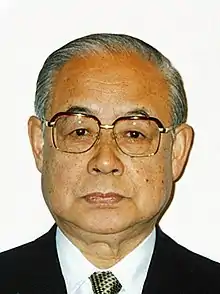Akira Mikazuki | |
|---|---|
| 三ヶ月 章 | |
 | |
| Minister of Justice | |
| In office 9 August 1993 – 28 April 1994 | |
| Prime Minister | Hosokawa Morihiro |
| Preceded by | Masaharu Gotoda |
| Succeeded by | Shigeto Nagano |
| Personal details | |
| Born | 1921 |
| Died | 14 November 2010 (aged 88–89) |
| Political party | Non-affiliated |
Akira Mikazuki (三ヶ月 章, Mikazuki Akira, 1921–14 November 2010) was a former justice minister of Japan and Professor Emeritus at Tokyo University.[1] He was a leading figure in civil procedure scholarship.[2][3]
Career
Mikazuki was an attorney and law professor.[4] He was a member of the Arbitration Law Study Group who drafted the arbitration law in 1989.[5]
He was appointed justice minister under the non-Liberal Democratic Party Hosokawa Morihiro cabinet, although he was not a politician.[6][7] He replaced Masaharu Gotoda as justice minister. He was in office from 9 August 1993 to 28 April 1994.[8] His successor was Shigeto Nagano.
Mikazuki reported that anyone who had plans to abolish capital punishment could not accept an appointment as justice minister.[4] He approved executions for four death row inmates and believed in the deterrent effect of capital punishment.[9] Four executions were carried out during his term in Autumn 1993.[10] He retired from politics in November 2010.[11]
Death
Awards
Mikazuki received the Order of Culture award in Tokyo on 7 November 2007.[14] He was also recipient of the following national awards: Medal with Purple Ribbon (1981), Order of the Sacred Treasure (1995; First Class), and Person of Cultural Merit (2005).[11] He was awarded the Order of Merit of the Federal Republic of Germany in 1990.[11]
References
- ↑ "Lord Mustill Lectures in Japan" (Newsletter). The Japan Commercial Arbitration Association. February 1997.
- ↑ Yasuhei Taniguchi (2007). "The Development of an Adversary System in Japanese Civil Procedure". In Daniel H. Foote (ed.). Law in Japan: A Turning Point. Seattle: University of Washington Press. p. 92. ISBN 978-0-295-98731-6.
- ↑ Taro Kogayu (2007). "French Law Research in the Study of Civil Law in Japan". In Zentaro Kitagawa; Karl Riesenhuber (eds.). The Identity of German and Japanese Civil Law in Comparative Perspectives. Berlin; Boston, MA: De Gruyter. p. 95. ISBN 978-3-11-091915-8.
- 1 2 Petra Schmidt (2002). Capital Punishment in Japan. Leiden: BRILL. p. 68. ISBN 978-90-04-12421-9.
- ↑ Yasunobu Sato (2001). Commercial Dispute Processing and Japan. The Hague; New York: Kluwer Law International. p. 386. ISBN 978-90-411-1668-0.
- ↑ Tomohito Shinoda (2000). Leading Japan: The Role of the Prime Minister. Westport, CT; London: Praeger. p. 84. ISBN 978-0-275-96994-3.
- ↑ Terry McCarthy (10 August 1993). "Hosokawa plays safe with cabinet". The Independent. Retrieved 3 January 2013.
- ↑ Henrik Schmiegelow (2006). "Why Legal Transformation Assistance from Germany and Japan to Former East-Bloc Countries?" (PDF). Journal of Japan Law (22).
- ↑ Obara Mika. "Capital Punishment in Japan: Unpacking Key Actors at the Governmental Level" (PDF). International Christian University. Archived from the original (PDF) on 4 March 2016. Retrieved 3 January 2013.
- ↑ Dana Domikova-Hashimoto (1996). "Japan and capital punishment". Human Affairs. 6 (1): 77–93. Archived from the original (PDF) on 7 March 2016.
- 1 2 3 "物故会員個人情報". japan-acad.go.jp (in Japanese). Retrieved 18 September 2023.
- ↑ Rei Shiratori (1996). "Description of Japanese Politics in 1995". European Journal of Political Research. 30.
- ↑ "Obituary Notice". The Japan Academy. Retrieved 3 January 2013.
- ↑ "Kyogen actor, four others chosen for culture awards". The Japan Times. Kyodo News. 28 October 2007. Retrieved 3 January 2013.
External links
 Media related to Akira Mikazuki at Wikimedia Commons
Media related to Akira Mikazuki at Wikimedia Commons